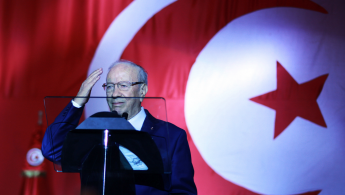Ennahdha wins, despite losing in Tunisia
Nidaa Tounes only won the recent elections in Tunisia by a few points, beating the moderate Islamist Ennahdha movement into second. It was not a knockout, as they say in boxing matches. Nidaa Tounes has been granted limited space, while Ennahdha still maintains ample room for manoeuvre.
Ennahdha's electoral loss was a surprise for its leaders and supporters. However, its deputy leader, Abdul Fatah Moro, appeared to be anticipating such a result in an interview [Ar] carried out with al-Araby al-Jadeed just before the election.
During the campaign, the Islamist movement had mobilised a wide support base, held well-organised public meetings and focused its efforts on winning the elections. It had shown its competitors it was strong and prepared to return to power. One of its campaign slogans was: "The people want Ennahdha's return."
| The first step Ennahdha took after the elections was to admit defeat and congratulate the winner. |
The first step Ennahdha took after learning of its loss was to admit defeat and congratulate the winner. In doing so, it showed political maturity and appeared as a rational political power, which also improved its international image.
After the election, the movement focused on its strengths which prevented it being undermined by the results. It emerged from the election with minimum damage having won 69 seats, which enables it to act as a counterbalance to the winning party.
Compared to weaker parties that were destroyed by the election, Ennahdha is now in a position to successfully manage the new political situation. Its leader Rached Ghannouchi announced his party was "open to all options and willing to serve Tunisia whether in a position of power or opposition".
Nidaa Tounes is facing difficult choices - each with a political cost. In contrast, Ennahdha can easily manage the different scenarios it has to confront. The Islamist party is ready to form a coalition government and return to power. Its leaders have confirmed the importance of forming a national government, and its willingness to lead the opposition.
We could therefore argue that the legislative elections saved Ennahdha from itself. Before they took place it was pushing to win and return to power. This happened after it was forced to leave the government in January 2014, due to a political crisis that almost destroyed the entire process of democratic transition.
If Ennahdha been re-elected it would now be in a situation it would be unable to manage. Things would have been more complicated than when it was last in power. This is because returning to power would have meant returning to a contested position. Today, Ennahdha can turn its electoral loss into a weapon it can use to achieve significant political gains. It just needs to take advantage of its competitor's weak points, and earn the trust of the remaining players - no matter how small they are.
This article is an edited translation from our Arabic edition.
Opinions expressed in this article remain those of the original author, and do not necessarily reflect the opinions of al-Araby al-Jadeed, its editorial board or staff.



